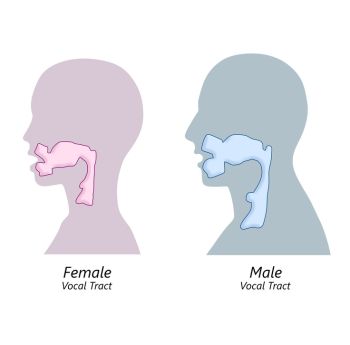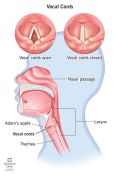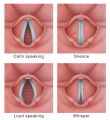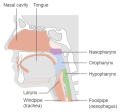(voice category) |
No edit summary |
||
| (4 intermediate revisions by the same user not shown) | |||
| Line 1: | Line 1: | ||
=== Voice Production === | === Voice Production === | ||
Sound is air vibrations. Voice production depends on airflow, pitch, resonance and | Sound is air vibrations. Voice production depends on airflow, pitch, resonance, articulation and intonation. | ||
[https://rapidvocalresults.com/the-diaphragm-explained/ Airflow]: the diaphragm muscle pushes up on the lungs, pressuring air up through trachea. Strengthening it creates a more powerful/loud voice.<gallery mode="nolines" heights="200"> | [https://rapidvocalresults.com/the-diaphragm-explained/ Airflow]: the diaphragm muscle pushes up on the lungs, pressuring air up through trachea. Strengthening it creates a more powerful/loud voice.<gallery mode="nolines" heights="200"> | ||
| Line 6: | Line 6: | ||
File:Vocal-cords.jpg|Vocal Cords | File:Vocal-cords.jpg|Vocal Cords | ||
</gallery> | </gallery> | ||
[https://taylorsciencegeeks.weebly.com/blog/pitch-and-frequency Pitch/Frequency]: The vocal cords chop up the flow of air from the trachea by opening and closing at a frequency which depends on their size and how tense the [[wikipedia:Thyroarytenoid_muscle|muscle]] is. How fast the vibration happens will determine if it's a high or low pitch sound.<gallery> | |||
[https://taylorsciencegeeks.weebly.com/blog/pitch-and-frequency Pitch/Frequency]: The vocal cords chop up the flow of air from the trachea by opening and closing at a frequency which depends on their size and how tense the [[wikipedia:Thyroarytenoid_muscle|muscle]] is. How fast the vibration happens will determine if it's a high or low pitch sound. | File:Vocal-cord-vibratory-cycle(1).jpg | ||
File:Pitch diagram.jpg | |||
File:Vocal fold animated.gif | |||
</gallery>[https://www.seattlevoicelab.com/2021/11/25/what-is-r1-r2-r3-how-do-they-effect-the-sound-of-your-voice/ Resonance]: Sound is amplified and modified by the vocal tract resonators like the throat, mouth cavity, and nasal passages. The resonators increase the loudness of certain frequencies and attenuate (decrease loudness) of other frequencies. When low frequencies are amplified it's considered "heavy" or "dark" resonance, and when high frequencies are amplified it's considered "light". <gallery mode="nolines"> | |||
File:Resonsnace-voicescienceworks.png|[https://www.voicescienceworks.org/resonance.html Resonance Chambers 1] | |||
File:Resonance Chambers 2.png|[[wikipedia:Pharynx|Resonance Chambers 2]] | |||
</gallery> | |||
[https://www. | [https://www.speechvoicelab.com/transfeminine-speakers#:~:text=Intonation,around%20more%2C%20with%20higher%20highs. Articulation and Intonation]: The vocal tract articulators like the tongue, soft palate, and lips modify the voiced sound. The articulators produce recognizable words. Intonation is the variation in pitch and is related to pattern and melody of speech. Together you can think of them as creating a way of speaking or accent. | ||
=== Female Voice === | === Female Voice === | ||
| Line 18: | Line 24: | ||
To achieve resonance you need to learn to use the muscles around your neck to force the larynx upwards and back in your throat which will decrease the length and width of your vocal tract, amplifying higher frequency sounds. http://lena.kiev.ua/voice/ | To achieve resonance you need to learn to use the muscles around your neck to force the larynx upwards and back in your throat which will decrease the length and width of your vocal tract, amplifying higher frequency sounds. http://lena.kiev.ua/voice/ | ||
=== Tools === | |||
For recording and visualizing your pitch and resonance https://acousticgender.space/ | |||
Latest revision as of 02:51, 27 November 2023
Voice Production
Sound is air vibrations. Voice production depends on airflow, pitch, resonance, articulation and intonation.
Airflow: the diaphragm muscle pushes up on the lungs, pressuring air up through trachea. Strengthening it creates a more powerful/loud voice.
-
Voice producing systems
-
Vocal Cords
Pitch/Frequency: The vocal cords chop up the flow of air from the trachea by opening and closing at a frequency which depends on their size and how tense the muscle is. How fast the vibration happens will determine if it's a high or low pitch sound.
Resonance: Sound is amplified and modified by the vocal tract resonators like the throat, mouth cavity, and nasal passages. The resonators increase the loudness of certain frequencies and attenuate (decrease loudness) of other frequencies. When low frequencies are amplified it's considered "heavy" or "dark" resonance, and when high frequencies are amplified it's considered "light".
Articulation and Intonation: The vocal tract articulators like the tongue, soft palate, and lips modify the voiced sound. The articulators produce recognizable words. Intonation is the variation in pitch and is related to pattern and melody of speech. Together you can think of them as creating a way of speaking or accent.
Female Voice

The main difference between male and female voice is male voice has a lower pitch and heavy weight. Testosterone increases the length and thickness of the vocal cords and also the size of the entire vocal tract itself.
In order to sound more feminine you need to train to both increase pitch (by tensing your cords) and lighten resonance (by raising your larynx and maintaining mouth posture). https://www.youtube.com/watch?v=21ZfGPp-Ves
To achieve resonance you need to learn to use the muscles around your neck to force the larynx upwards and back in your throat which will decrease the length and width of your vocal tract, amplifying higher frequency sounds. http://lena.kiev.ua/voice/
Tools
For recording and visualizing your pitch and resonance https://acousticgender.space/
Pages in category "Voice"
The following 2 pages are in this category, out of 2 total.





